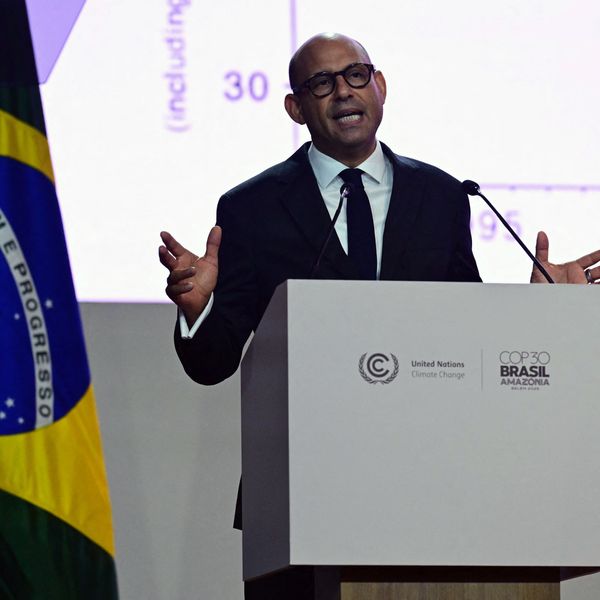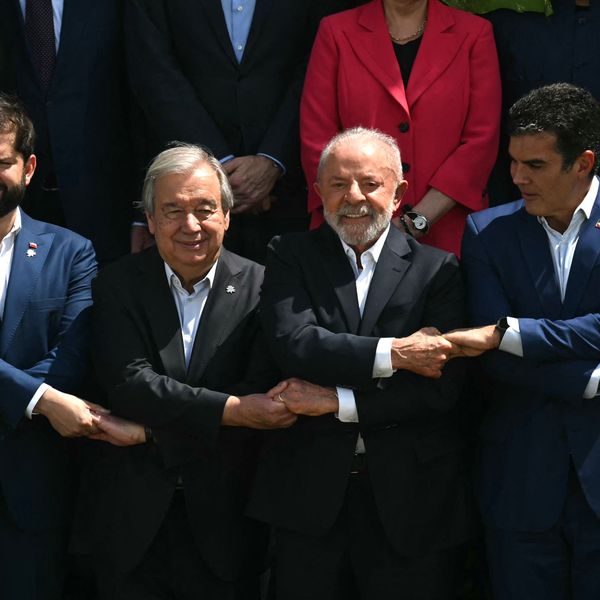UN to Investigate Climate Email Row
NEW YORK - The United Nations is to conduct an investigation into emails leaked from a leading British climate science centre which appeared to show some of the world's leading scientists discussing ways to shield data from public scrutiny and suppress others' work.
The University of East Anglia has defended the integrity of the science published by its Climatic Research Unit and its researchers, but said on Thursday that it would also check whether some of the data had been fudged.
Those who argue against the influence of man-made climate change have seized on the correspondence to argue that scientists have been conspiring to hide evidence about global warming.
In an interview with BBC radio, Rajendra Pachauri, the chairman of the UN's Intergovernmental Panel on Climate Change, said the issue raised by the emails was serious and said "we will look into it in detail".
Pauchauri said: "We will certainly go into the whole lot and then we will take a position on it ... we certainly don't want to brush anything under the carpet."
University probe
Phil Jones, the director of the university's climatic unit, stepped down Tuesday pending the result of the institution's investigation.
East Anglia said its review will examine the emails and other information "to determine whether there is any evidence of the manipulation or suppression of data which is at odds with acceptable scientific practice".
The theft of the emails and their publication online is likely to be a major source of debate at a major UN summit on global warming which begins on Monday in Copenhagen, the Danish capital.
Republicans in the House of Representatives in the United States grilled government scientists about the leaked emails during a hearing on Wednesday in Washington, but the scientists countered that the emails did not change the fact that the they believe the earth is warming.
"The emails do nothing to undermine the very strong scientific consensus ... that tells us the earth is warming, that warming is largely a result of human activity," said Jane Lubchenco, head of the National Oceanic and Atmospheric Administration.
She said the emails do not address data from her agency or Nasa, the US space agency, which both keep independent climate records that show dramatic global warming.
An Urgent Message From Our Co-Founder
Dear Common Dreams reader, The U.S. is on a fast track to authoritarianism like nothing I've ever seen. Meanwhile, corporate news outlets are utterly capitulating to Trump, twisting their coverage to avoid drawing his ire while lining up to stuff cash in his pockets. That's why I believe that Common Dreams is doing the best and most consequential reporting that we've ever done. Our small but mighty team is a progressive reporting powerhouse, covering the news every day that the corporate media never will. Our mission has always been simple: To inform. To inspire. And to ignite change for the common good. Now here's the key piece that I want all our readers to understand: None of this would be possible without your financial support. That's not just some fundraising cliche. It's the absolute and literal truth. We don't accept corporate advertising and never will. We don't have a paywall because we don't think people should be blocked from critical news based on their ability to pay. Everything we do is funded by the donations of readers like you. Will you donate now to help power the nonprofit, independent reporting of Common Dreams? Thank you for being a vital member of our community. Together, we can keep independent journalism alive when it’s needed most. - Craig Brown, Co-founder |
NEW YORK - The United Nations is to conduct an investigation into emails leaked from a leading British climate science centre which appeared to show some of the world's leading scientists discussing ways to shield data from public scrutiny and suppress others' work.
The University of East Anglia has defended the integrity of the science published by its Climatic Research Unit and its researchers, but said on Thursday that it would also check whether some of the data had been fudged.
Those who argue against the influence of man-made climate change have seized on the correspondence to argue that scientists have been conspiring to hide evidence about global warming.
In an interview with BBC radio, Rajendra Pachauri, the chairman of the UN's Intergovernmental Panel on Climate Change, said the issue raised by the emails was serious and said "we will look into it in detail".
Pauchauri said: "We will certainly go into the whole lot and then we will take a position on it ... we certainly don't want to brush anything under the carpet."
University probe
Phil Jones, the director of the university's climatic unit, stepped down Tuesday pending the result of the institution's investigation.
East Anglia said its review will examine the emails and other information "to determine whether there is any evidence of the manipulation or suppression of data which is at odds with acceptable scientific practice".
The theft of the emails and their publication online is likely to be a major source of debate at a major UN summit on global warming which begins on Monday in Copenhagen, the Danish capital.
Republicans in the House of Representatives in the United States grilled government scientists about the leaked emails during a hearing on Wednesday in Washington, but the scientists countered that the emails did not change the fact that the they believe the earth is warming.
"The emails do nothing to undermine the very strong scientific consensus ... that tells us the earth is warming, that warming is largely a result of human activity," said Jane Lubchenco, head of the National Oceanic and Atmospheric Administration.
She said the emails do not address data from her agency or Nasa, the US space agency, which both keep independent climate records that show dramatic global warming.
NEW YORK - The United Nations is to conduct an investigation into emails leaked from a leading British climate science centre which appeared to show some of the world's leading scientists discussing ways to shield data from public scrutiny and suppress others' work.
The University of East Anglia has defended the integrity of the science published by its Climatic Research Unit and its researchers, but said on Thursday that it would also check whether some of the data had been fudged.
Those who argue against the influence of man-made climate change have seized on the correspondence to argue that scientists have been conspiring to hide evidence about global warming.
In an interview with BBC radio, Rajendra Pachauri, the chairman of the UN's Intergovernmental Panel on Climate Change, said the issue raised by the emails was serious and said "we will look into it in detail".
Pauchauri said: "We will certainly go into the whole lot and then we will take a position on it ... we certainly don't want to brush anything under the carpet."
University probe
Phil Jones, the director of the university's climatic unit, stepped down Tuesday pending the result of the institution's investigation.
East Anglia said its review will examine the emails and other information "to determine whether there is any evidence of the manipulation or suppression of data which is at odds with acceptable scientific practice".
The theft of the emails and their publication online is likely to be a major source of debate at a major UN summit on global warming which begins on Monday in Copenhagen, the Danish capital.
Republicans in the House of Representatives in the United States grilled government scientists about the leaked emails during a hearing on Wednesday in Washington, but the scientists countered that the emails did not change the fact that the they believe the earth is warming.
"The emails do nothing to undermine the very strong scientific consensus ... that tells us the earth is warming, that warming is largely a result of human activity," said Jane Lubchenco, head of the National Oceanic and Atmospheric Administration.
She said the emails do not address data from her agency or Nasa, the US space agency, which both keep independent climate records that show dramatic global warming.

